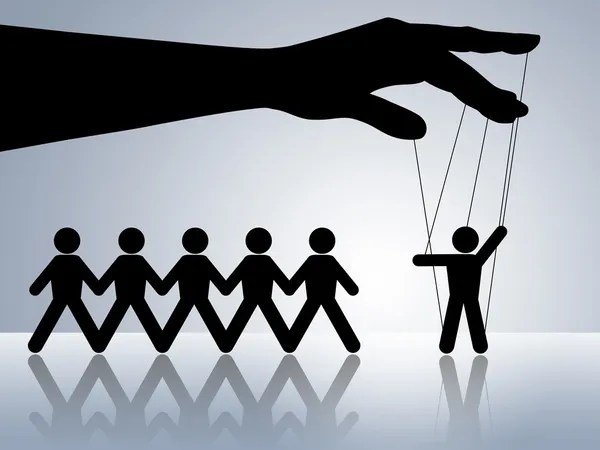Knowing how to deal with controlling people can be incredibly challenging, whether they are family members, friends, coworkers, or romantic partners. These individuals often attempt to dominate or manipulate situations to fulfill their own needs, leaving others feeling overwhelmed, drained, and powerless.
Control dynamics in human relationships can be subtle or overt, and the emotional toll it takes on those at the receiving end can be significant. Regulatory behavior can manifest in many ways, from overt acts of dominance and manipulation to more subtle tactics like guilt-tripping or passive-aggressive communication.
The key to dealing with controlling people lies in understanding their motivations, recognizing the signs of control, and empowering yourself with strategies to handle the situation effectively. If left unchecked, controlling behavior can negatively impact your mental health, self-esteem, and relationships.
In this article, we will explore strategies for effectively dealing with controlling people in various aspects of life. These approaches are designed to protect your own well-being and create healthier, more balanced relationships, whether personal or professional.
Tips To Deal With Controlling People

1. Recognizing Controlling Behavior
Before you can know how to deal with controlling people, it’s essential to first understand what controlling behavior looks like. Controlling people often seek to dominate the decisions and actions of others. They may do so through various methods, including manipulation, guilt-tripping, criticism, and sometimes even emotional abuse.
In personal relationships, controlling individuals might dictate what their partner wears, where they go, or who they associate with. In the workplace, a controlling boss might micromanage employees, disregarding their autonomy or undermining their confidence. Family members, particularly parents, may impose rigid expectations and make decisions for others, even in adulthood.
Controlling behavior often leads to feelings of frustration, resentment, and helplessness in the person being controlled. It can leave the individual with little room to express themselves or make their own choices, creating a toxic environment that stifles personal growth and happiness. Recognizing the signs of controlling behavior early is crucial to preventing long-term negative effects. These behaviors include:
- Constant criticism: Rather than offering constructive feedback, controlling people tend to belittle, criticize, or undermine others.
- Manipulation: They may guilt-trip or emotionally manipulate you into doing things that suit their agenda.
- Micromanagement: In work or personal contexts, they insist on controlling every aspect of a situation.
- Isolation: Some controlling people isolate their victims from other sources of support, such as friends and family, to maintain dominance.
- Inability to compromise: They rarely, if ever, meet you halfway and often refuse to accept others’ opinions or needs.
By recognizing these behaviors, you can begin to understand the dynamics at play in your relationships and work toward finding healthy solutions.
2. Set Clear Boundaries
One of the most effective answers to how to deal with controlling behavior is by setting clear and firm boundaries. Boundaries are essential for maintaining your emotional and mental well-being, especially when dealing with individuals who try to infringe on your personal space or decisions. When you allow someone to overstep their boundaries, you permit them to control your life in subtle or overt ways.
Setting boundaries involves defining what is acceptable and unacceptable behavior, both for yourself and for others. It’s about asserting your needs, desires, and limits in a respectful yet firm way. Some examples of boundaries when dealing with controlling people include:
- Saying “no” without guilt: You have the right to say no when someone’s request makes you uncomfortable, and you do not need to offer a lengthy explanation.
- Refusing to tolerate emotional manipulation: If a controlling person tries to manipulate you through guilt or other emotional tactics, calmly state that you will not engage in that behavior.
- Respecting your time and space: Be clear about your time, and don’t allow anyone to constantly invade your privacy or dictate your schedule.
Enforcing boundaries can be difficult, especially if you’ve allowed the controlling behavior to persist for a long time. The key is to be consistent and unwavering, even if the other person attempts to push back or guilt-trip you.
3. Communicate Effectively
Effective communication is a powerful tool for managing and reducing controlling behavior. When dealing with a controlling person, it’s essential to communicate assertively but calmly. Assertive communication involves expressing your thoughts, feelings, and needs directly without aggression or submission. Here are some tips for communicating with controlling people:
- Stay calm and composed: Controlling individuals often thrive on provoking an emotional response. By staying calm, you deny them the reaction they seek.
- Use “I” statements: Instead of accusing or blaming, frame your message in a way that focuses on how their behavior makes you feel. For instance, instead of saying, “You always try to control me,” say, “I feel disrespected when my decisions are constantly questioned.”
- Set limits on the conversation: If the controlling person becomes aggressive or manipulative during a conversation, calmly let them know you are not willing to engage in the discussion until it becomes respectful.
Effective communication also means knowing when to walk away from a conversation. If the person continues to push boundaries or engage in manipulative behavior, it’s okay to disengage and resume the discussion later when emotions are more stable. It is the vital tip on how to deal with controlling people.
4. Remain Calm and Emotionally Detached
When dealing with them, one of the most helpful answers to how to deal with controlling people is to remain emotionally detached. Controlling individuals often try to provoke strong emotional reactions, whether through guilt, anger, or frustration.
By remaining calm and emotionally neutral, you prevent them from gaining control over your emotional state. Emotional detachment doesn’t mean becoming cold or distant. It means acknowledging your emotions without allowing them to control your actions or reactions. This involves:
- Not taking things personally: Controlling people often act out of their insecurities or need for power. Their behavior is not a reflection of your worth.
- Creating emotional distance: When you detach emotionally, you stop internalizing their behavior and are better able to respond with clarity.
- Practicing mindfulness: Take a few deep breaths, pause, and reflect before reacting to a controlling person’s actions or words. This helps you regain control of the situation.
5. Use the “Broken Record” Technique
The “Broken Record” technique is a powerful answer to how to deal with controlling behavior, especially those who are persistent in trying to get you to agree to their demands or bend to their will. This technique involves repeating the same statement or request in a calm, consistent manner, without getting drawn into further discussions, arguments, or emotional traps.
For instance, if a controlling person is trying to pressure you into making a decision you’re not comfortable with, you can simply repeat, “I understand your perspective, but I’ve already made my decision.” By consistently restating your stance, you show that you are not willing to entertain any further manipulation. The key to using the broken record technique effectively is:
- Staying firm: Don’t deviate from your position, no matter how much the controlling person pushes.
- Remaining calm and collected: The calmer and more composed you are while using this technique, the more effective it will be in stopping further manipulation.
- Repeating without defensiveness: You are not there to justify your decision or get into an emotional argument. You simply need to communicate your decision and remain consistent.
For example, if someone is pressuring you to attend an event you’re not interested in, you could say, “I’m not available that day, and I’m not interested in attending.” If they persist, simply repeat, “I’m not available that day,” until the conversation shifts.
The broken record technique works best when the controlling person realizes they can no longer manipulate or guilt-trip you into changing your mind. Over time, they will learn that persistence is futile, and they’ll be able to regain control of their space. That’s the best tip on how to deal with controlling people.
6. Understand Their Motivations
Understanding the motivations behind controlling behavior can be incredibly helpful in navigating your interactions with controlling people. It’s easy to assume that controlling people are just selfish or malicious, but often, their behavior stems from deeper insecurities or past experiences. In some cases, controlling people may act out of fear—fear of losing control, fear of failure, or fear of being vulnerable.
In other cases, they may have learned these behaviors as coping mechanisms from their own past relationships or family dynamics. Recognizing these underlying motivations doesn’t excuse their behavior, but it can help you approach the situation with greater empathy. Here are a few motivations that might drive controlling behavior:
- Insecurity: Often, people who are insecure about their abilities or worth will attempt to control others as a way of maintaining a sense of stability or dominance.
- Fear of loss or rejection: Some individuals may attempt to control others to avoid feeling abandoned or rejected. This can be seen in unhealthy relationships, where one partner constantly controls the other out of fear of them leaving.
- Desire for power: In some cases, people may simply desire power or dominance over others, and controlling behavior is a tool they use to maintain that sense of authority.
Understanding the controlling person’s motivations can help you engage with them from a more compassionate standpoint, without condoning their behavior. However, it’s important to keep in mind that understanding why they act the way they do does not mean you should tolerate their control. It simply allows you to navigate the situation with more insight.
7. Choose Your Battles Wisely
In any relationship with a controlling person, it’s crucial to pick your battles carefully. Not every situation requires a fight, and not every disagreement needs to be resolved immediately. Sometimes, it’s wiser to let minor issues slide, especially if pushing back would escalate the situation unnecessarily. When dealing with a controlling person, ask yourself if the issue is truly important enough to challenge.
For example, if a controlling person is attempting to dictate where you go for dinner, this might not be the best moment to engage in a confrontation. However, if they are making significant decisions for you or infringing upon your boundaries more seriously, that is an opportunity to stand your ground. Here are a few tips for choosing your battles wisely:
- Assess the importance of the issue: Is the situation worth engaging in conflict? Sometimes, it’s best to let smaller issues slide and save your energy for more significant matters.
- Consider the impact of your response: Will standing your ground lead to a productive outcome, or will it escalate tensions? Sometimes disengaging is the most effective strategy.
- Know when to walk away: In some cases, it may be better to exit the conversation and address the issue later when emotions are less charged.
Choosing your battles wisely is a form of self-care. It allows you to conserve your emotional energy and prevent unnecessary drama. By picking your battles, you avoid getting drawn into a constant power struggle with a controlling person.
8. Seek Support and Professional Help
Dealing with a controlling person can be exhausting, especially if the relationship or situation is ongoing. It can take a toll on your mental and emotional health. This is why seeking support from others is so important. Whether it’s from trusted friends, family members, or a therapist, having a support system can provide you with perspective and emotional strength. Here are some steps you can take to seek support:
- Talk to trusted friends or family: Talking to others about your experiences can help you process your emotions and gain insight into the situation. Often, others can offer practical advice or reassurance that you’re not alone.
- Consider therapy or counseling: A therapist can help you develop coping strategies, build confidence, and address any trauma caused by the controlling person. Therapy also provides a safe space to explore the dynamics of the relationship and whether it’s worth continuing.
- Couples or family therapy: If you’re dealing with a controlling partner or family member, couples or family therapy can be a helpful way to mediate the situation and establish healthier communication patterns.
Support from others not only validates your feelings but also strengthens your ability to enforce boundaries and take action when necessary. Having an outside perspective can often help you see things more clearly and make decisions with a clearer mind.
Summing Up
Figuring out how to deal with controlling people can be incredibly challenging, but by employing these strategies, you can take back control of your life and relationships. It’s essential to recognize controlling behaviors early, establish firm boundaries, communicate effectively, and understand the motivations behind the behavior.
Emotional detachment, using the Broken Record technique, choosing your battles wisely, and seeking support from others can further protect your mental well-being and allow you to navigate these relationships more confidently.
Keep in mind that you are entitled to live your life as you see fit. Dealing with controlling people doesn’t mean you need to fight or confront them at every turn, but it does mean asserting your needs and protecting your boundaries.
As you begin to implement these strategies, you will not only protect yourself from manipulation and control but also foster healthier, more respectful relationships. By taking action, standing firm, and seeking the support you need, you can regain your personal autonomy and live a life free from the influence of controlling behavior.
FAQ
Q: What is controlling behavior?
A: Your freedom and independence may be restricted by the controlling person if they prevent you from seeing friends, relatives, and other encouraging individuals or make you feel bad about spending time with them. Erecting obstacles that make it difficult to leave the relationship, including financial, social, and emotional ones.
Q: What makes people want to be in charge?
A: Difficulty tolerating uncertainty may be associated with a continuous need or desire for control. You could be attempting to establish a feeling of security and predictability by attempting to control every element of a scenario.
Q: Is it possible to alter controlling people?
A: People may unlearn controlling tendencies and get assistance for abusive actions if they so want. People can change, we think. It is feasible, but it requires effort, dedication, and time.












Your house is valueble for me. Thanks!…
Thank you! 😊 That means a lot to me. Glad to have you here!